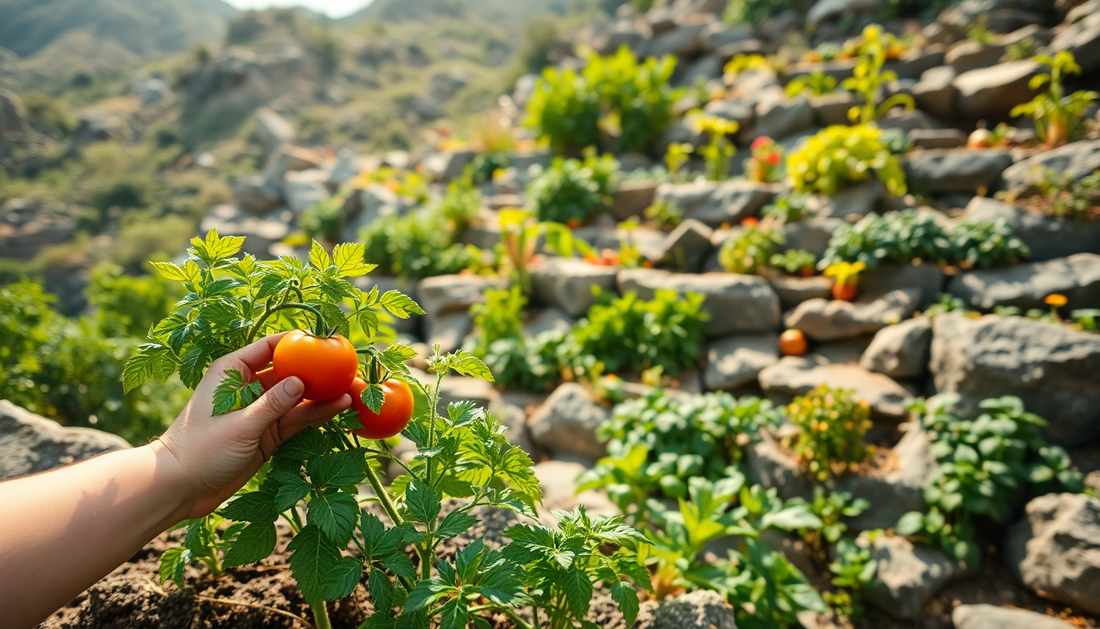
Thriving in Rocky Soil: A Guide to Growing Bountiful Vegetables
Share
Gardening in rocky soil can be a daunting task, but with the right approach, you can transform your challenging landscape into a thriving oasis of fresh, homegrown produce. Whether you're a seasoned green thumb or a budding gardener, this comprehensive guide will equip you with the knowledge and techniques to cultivate a successful vegetable garden, even in the most unforgiving of soil conditions.
Understanding Your Rocky Soil
The first step in conquering rocky soil is to understand its unique characteristics and how they impact plant growth. Rocky soil is typically dense, compacted, and low in organic matter, making it difficult for plant roots to penetrate and access the necessary nutrients and moisture.
Identifying the Challenges
Rocky soil can present several challenges for vegetable gardening, including:
- Drainage Issues: The dense, compact nature of rocky soil can lead to poor drainage, causing waterlogging and inhibiting root growth.
- Nutrient Deficiencies: Rocky soil is often lacking in essential nutrients, such as nitrogen, phosphorus, and potassium, which are crucial for healthy plant development.
- Compaction: The dense, rocky structure of the soil can make it difficult for plant roots to spread and access the resources they need.
- Shallow Rooting Depth: The presence of rocks and stones can limit the depth to which plant roots can grow, restricting their ability to access water and nutrients.
Assessing Your Soil
Before you begin your gardening journey, it's essential to assess the condition of your rocky soil. Take soil samples and have them tested to determine the pH level, nutrient content, and overall composition. This information will guide you in selecting the most appropriate vegetables and implementing the necessary soil amendments.
Preparing Your Rocky Soil for Planting
Once you've gained a better understanding of your soil's characteristics, it's time to start preparing it for planting. This process may require a bit more effort than traditional gardening, but the rewards will be well worth it.
Improving Soil Structure
To address the challenges of rocky soil, you'll need to focus on improving its structure and texture. This can be achieved through the addition of organic matter, such as compost, peat moss, or well-rotted manure. These amendments will help to loosen the soil, increase water-holding capacity, and provide essential nutrients for your plants.
Building Raised Beds
Another effective strategy for gardening in rocky soil is to create raised beds. By constructing raised beds, you can create a more favorable growing environment for your vegetables, as the soil in the beds will be less compacted and have better drainage. Additionally, raised beds allow you to control the soil composition more precisely, making it easier to create the ideal conditions for your plants.
Incorporating Gravel or Stones
While rocks and stones may seem like the enemy in a vegetable garden, they can actually be used to your advantage. By strategically placing gravel or larger stones at the bottom of your raised beds, you can improve drainage and prevent waterlogging. This technique can be particularly useful in areas with heavy rainfall or poor natural drainage.
Selecting the Right Vegetables
Not all vegetables are created equal when it comes to growing in rocky soil. Some plants are better equipped to thrive in these challenging conditions, while others may struggle. When choosing your vegetable varieties, consider the following:
Root Depth and Structure
Select vegetables with deep, extensive root systems that can penetrate the rocky soil and access the necessary resources. Examples include carrots, parsnips, and beets.
Nutrient Requirements
Choose vegetables that have lower nutrient requirements or are more tolerant of nutrient-poor soil, such as tomatoes, peppers, and leafy greens.
Water Needs
Consider vegetables that are more drought-tolerant and can withstand the occasional periods of dryness that may occur in rocky soil, like zucchini, eggplants, and certain types of beans.
Ongoing Maintenance and Care
Maintaining a successful vegetable garden in rocky soil requires a consistent and proactive approach. Here are some key strategies to keep your plants thriving:
Mulching
Applying a thick layer of organic mulch, such as wood chips or straw, around your plants can help retain moisture, suppress weeds, and gradually improve soil structure over time.
Fertilizing Regularly
Supplement your soil with a balanced, slow-release fertilizer or compost tea to ensure your plants receive the necessary nutrients for optimal growth.
Monitoring Soil Moisture
Keep a close eye on soil moisture levels and adjust your watering schedule accordingly. Avoid overwatering, as this can lead to root rot and other issues in rocky soil.
Rotating Crops
Implement a crop rotation system to prevent the depletion of specific nutrients and discourage the buildup of pests or diseases in your garden.
By following these strategies and embracing the unique challenges of rocky soil, you can create a thriving vegetable garden that provides a bountiful harvest year after year. Remember, with patience, dedication, and a little bit of creativity, even the most unforgiving soil can be transformed into a lush, productive oasis.

